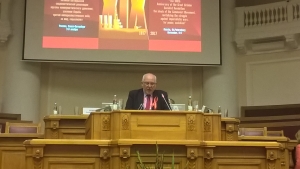Workers Party of Ireland
Statement of the WPI delegation in Moscow to celebrate the October Revolution

Comrade Gerry Grainger, International Secretary of the Workers’ Party of Ireland addressing the meeting in Moscow today
V.I. Lenin: “We have made the start. When, at what date and time, the proletarians of which nation will complete this process is not important. The important thing is that the ice has been broken; the road is open, the way has been shown.”
Today we celebrate the 100th anniversary of the Great October Socialist Revolution, one of the greatest events in human history, an occasion of historic global significance which changed forever the power relations between exploiters and exploited and made real the vision of a new socialist society. The Workers Party is proud to participate in the Moscow celebrations with communist and workers’ parties from across the world. On 25 October 1917 the socialist revolution that took place in Russia was the first and the greatest successful workers’ revolution in history, translating into practice the revolutionary ideas of Marx and Engels.
The October Revolution took place because the Bolsheviks were armed with two indispensable weapons – first, a dynamic revolutionary theory and secondly, a disciplined revolutionary party committed to leading the working class to power.
The October Revolution transferred power to the working class, broke down the machinery of the bourgeois state and established the world’s first workers’ state. The object of the October Revolution was to abolish all forms of exploitation and oppression and to construct a new society based on socialist ideas. The Revolution inspired the workers and oppressed of the world and offered real prospects for change and invested the workers’ movement with a revolutionary consciousness and objective, educating, organising and mobilising the mass of the working people in the task of building a new society.
The October Revolution transformed the world. It constituted a decisive break with the old world order, abolished private ownership of the means of production and laid the basis for the political, social and economic liberation of humankind.
Under Soviet power life expectancy and literacy levels were increased, the living conditions and material well-being of the people were improved and the health and education of citizens was secured. The October Revolution created the basis for material and social advancement, for the transfer of power to the working people, the creators of wealth, and provided the workers with the opportunity, through their labour and struggle, to build the social, political, economic and cultural conditions which offered the prospect of a free and fulfilled life.
The Revolution declared important rights for women, equality under the law, the right to divorce, and the right to free and legal abortion. These gave women the right to control their wages and property, maintain a claim to their children in
the event of divorce, and to decide where they wanted to live, go to school, and to work.
The industrialisation of the economy, the expansion of medical and health services, the development of educational provision and training, the measures taken to provide for culture, literature and sport, the development of agriculture, scientific and technological progress and the improvement in the material conditions of working people were among the many accomplishments of the revolution.
The October Revolution continues to demonstrate that the purpose of the revolution is to establish workers’ power and that socialist construction begins with the revolutionary acquisition of power by the working class. The workers’ state, the dictatorship of the proletariat, is an instrument of the working class in the class struggle. Real, fundamental, transformative change requires a rupture with the capitalist system and its abolition, to create a world where the working class controls its own destiny under socialism-communism and a society which maximises human potential, dignity and development rather than a system driven by the relentless pursuit of profit for the benefit of the few.
